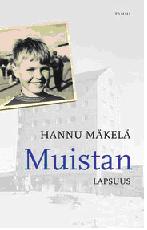
Luin Hannu Mäkelän lapsuudestaan kirjoittaman kirjan enkä oikein saanut siihen kunnon otetta tai tuntua. Huomasin hänen vuonna 1999 julkaisseen kirjan nimeltä Äiti ja viisi vuotta myöhemmin kirjan nimeltä Isä. Ne luettuani olin vielä suuremman hämmennyksen vallassa ja mietin, mitä tekijä olisi itse aikanaan kustannusjohtajana toimiessaan ajatellut, jos kirjailija olisi tuonut hänelle tällaisen käsikirjoituksen . Siinä kerrataan pitkälti samoja asioita kuin kahdessa aiemmin julkaistussa teoksessa, vieläpä useita yksityiskohtia ja tapahtumia kaksi, ellei kolme tai neljäkin kertaa yhdessä tai useammassa kirjassa toistaen. Ehkäpä Lapsuuden kustantajan ei tarvinnut ottaa tähän kantaa, kun aiemmat kirjat oli julkaistu toisen kustantajan toimesta.
Hannu Mäkelä on syntynyt vuonna 1943 vanhempiensa kolmantena lapsena, vaiheessa jossa vanhempien avioliitto jo oli käytännössä ohitse ja jolloin isä heti Hannun syntymän jälkeen myös lopullisesti jätti perheensä. Vanhemmat olivat molemmat kansakoulunopettajia, mutta isällä oli korkeampia ambitioita harrastekirjoittajana, maalarina, ex-libristen tekijnä ja säveltäjänä. Missään niissä hän ei yltänyt ainakaan pojan mielestä mainittavalle tasolle. Mutta eipä isäkään arvostanut poikaansa, jolle hän jo varhain latasi: ”Sinusta, Hannu, ei ikinä tule kirjailijaa”. Eikä hän tätä mielipidettä 102 vuotta kestäneen elämänsä aikana koskaan muuttanut, eikä sitkeästä isä-vihastaan jo kolmessa kirjassaan kertonut Hannu Mäkelä koskaan unohtanut. Kuten ei sitäkään kaikessa kolmessa kirjassa mainittua asiaa, että ainoa joululahja jonka Hannu koskaan isältään sai, olivat pojan käyttöön lahjoitetut isän vanhat alushousut (jotka äiti kuitenkin piilotti).
Äitiinsä Hannu Mäkelällä oli läheisempi suhde – vaikka ei suinkaan ongelmaton – mikä näkyy siinä miten pohjimmiltaan ymmärtävästi ja myötätuntoisesti hän käsittelee sairauden näännyttämän äitinsä viimeisiä viikkoja. Kirjailija voi aina ottaa kirjailijan vapauksia sekä aiheenvalinnassaan että kerronnassaan. Jää silti kysymään onko se tapa, jolla Mäkelä kirjoittaa vanhemmistaan näiden kuoleman jälkeen korrekti ja tarpeellinen? Vertailukohteena tulee mieleen Jan Myrdalin vielä Alva ja Gunnar Myrdalin eläessä kirjoittamat vanhempiaan armottomasti käsitelleet lapsuusmuistelmat, joilla kuitenkin on huomattavasti paremmat edellytykset jäädä Ruotsin kirjallisuuden klassikko-osastoon kuin Mäkelän kertomuksilla Suomen.
Kysymyksen virittää sekin, että isä ja poika joutuivat isän vielä eläessä outoon julkiseen polemiikkiin pojan haastettelusta Kotiliedessä, jossa tämä kertoi kuinka isä ”tuli sodasta käytännössä jo vaimonsa jättäneenä lähinnä hakemaan tavaransa. Seurauksena synnyin minä”. Kuvaus ei vastannut isän käsitystä asiasta ja hän kirjoitti oikaisun, johon poika puolestaan vastasi omallaan. Lehti kuitenkin viisaasti jätti molemmat julkaisematta. Mutta kirjoillaan poika on kuitenkin varannut itselleen viimeisen sanan, johon vastinetta ei enää voi jättää.
Toki toista sataa, runoista lastenkirjojen ja romaanien kautta mm. Eino Leino ja Casanova -elämäkertoihin yltävää teosta julkaissut kirjoittamisen taidon hallitsee. Monista kysymyksistä ja vähän vastaväitteistäkin huolimatta on myös tunnustettava, että Lapsuus kertoo avoimesti ja osin oivaltavasti kipeistä asioista, jos kohta kirjailijalle kuuluvalla subjektiivisuudella. Sama koskee myös Mäkelän myöhempiä vaiheita nyt vain ohimenevästi käsitteleviä osioita hänen urastaan kustannustoimittajana ja kanssakäymisestään muiden kirjailijoiden kanssa. Mutta ehkä näidenkin muistelmien aika vielä tulee.
Syyskuu 2011
PS. Edelläoleva on kirjoitettu ennen Hannu Mäkelän kanssa tästä kirjasta Kirjan takana-ohjelmaan tekemääni haastattelua. Haastattelun jälkeen annoin kirjasta kolme ja puoli tähteä viidestä ja olisin tehnyt siitä selvästi myönteisemmän arvion. Tämä vain osoittaa, että kirjailijan ajatuksiin ja perusteihin paneutuminen auttaa usein lukemaan hänen kirjaansa ymmärtävämmin ja arvostavammin, jos sellaiseen tarjoutuu tilaisuus.
